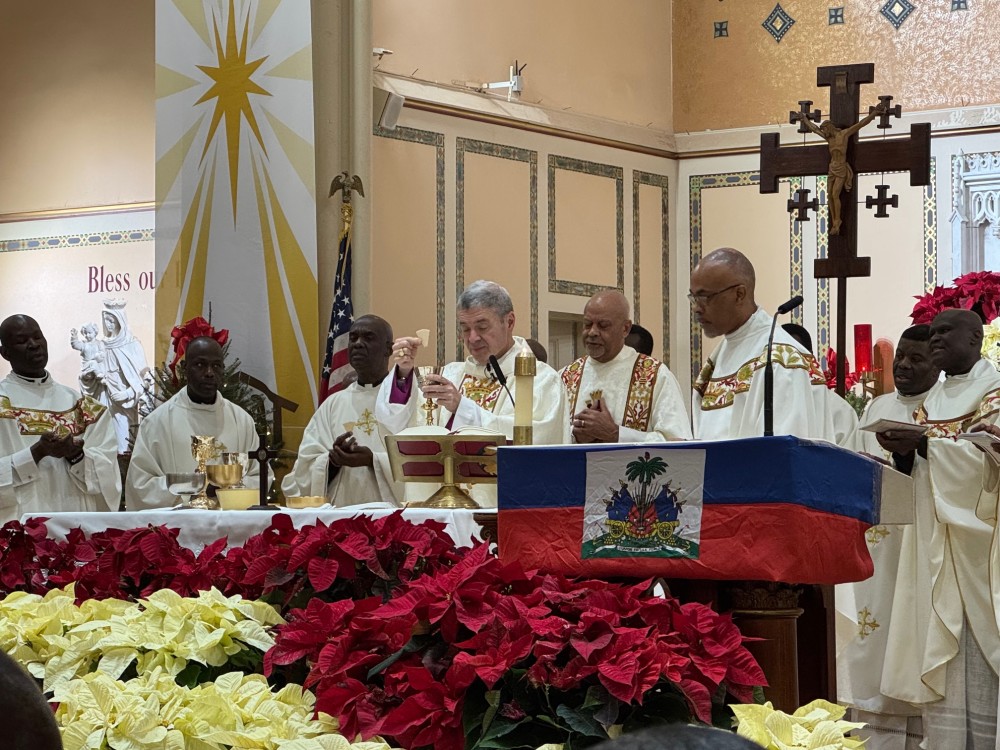
EAST FLATBUSH — Reflecting on the “horrendous” state of Haiti, Michele Guerrier said the Haitian Independence Day Mass at St. Jerome Church was a powerful show of solidarity to her homeland from the Diocese of Brooklyn.
“If you look at all of the images of Haiti, all you see is gang activity — the poverty,” said Guerrier, a parishioner of St. Thérèse of Lisieux in East Flatbush who lived in Haiti as a young child. “But today is a day for us to show the other side — that we are a proud people, that we see what is going on in our country, and we are not sitting idle.”
Haiti gained its independence from France on Jan. 1, 1804, after a revolution that began in 1791. Parishioners filled the pews of St. Jerome’s to not only honor the nation’s independence 221 years later but also acknowledge those Haitians who are currently stranded in the nation plagued by gang violence, political instability, and economic strife.
On Nov. 12, the Federal Aviation Administration imposed a ban on U.S. civilian flights to and from Haiti until March 2025 after a Spirit Airlines plane was hit by gunfire while attempting to land in Port-au-Prince the day before. The ban has prevented much-needed aid from reaching the nearly 703,000 people who have been displaced due to gang violence and widespread insecurity, according to the UN Refugee Agency.
The Haitian Independence Day Mass was celebrated by Bishop Robert Brennan and concelebrated by 10 other diocesan priests.
Father Hilaire Belizaire, pastor of St. Jerome’s and the coordinator of the Diocese of Brooklyn’s Ministry to Haitian Immigrants, said that the Mass is a time to thank God for the gift of independence and to remember those in Haiti who are in need. Father Belizaire said last year the diocese raised $16,000 to help the Diocese of Fort-Liberté, Haiti, build a canal.
He said fundraising efforts to support Haiti will continue in the new year.
Mercedes Narcisse, a New York City Council member, who was born in Saint Marc, Haiti, was invited by Father Belizaire to speak at a dinner preceding the Mass. She said she’s on a “mission” to educate anyone she can on Haiti’s liberation.
“A lot of people did not know that Haiti was the first black republic that got their independence — I was shocked,” Narcisse said. “I hope that everyone, not only those of Haitian descent, sees the role that Haiti played for the freedom of everyone.”
“Not only black people, Jewish people, and Greeks were fleeing to Haiti,” she noted. “People from South America were fleeing to Haiti because Haiti was a place where you can be free.”
Beginning in 1938, Jewish refugees from Central Europe migrated to Haiti with help from the American Jewish Joint Distribution Committee, a Jewish relief organization. According to the committee’s archives, by the time World War II interrupted travel, around 150 Jews had relocated to the Caribbean nation.
Father Belizaire said he remembers arriving in America and explaining to his classmates what Haiti is like, eventually becoming a full history lesson.
“There was no going to the library and finding a book that talked about the real history of Haiti,” Father Belizaire explained. “I especially want our young people to understand the value of what our ancestors were able to accomplish — the first successful black revolution.”
Coupled with the new year, Bishop Brennan said the Haitian Independence Day Mass is an important event. He told The Tablet it’s a day for “the world” because of how Haiti inspired others to achieve independence. With the ongoing violence on the island, Bishop Brennan asks the faithful to live in solidarity and send prayers to Haiti.
“Pope Francis has called this year a year of solidarity, and I think that’s what we really want to focus on, and that comes in a very special way as we offer our prayers for Haiti,” Bishop Brennan said. “2025 has already opened on a very violent note, and so we turn our eyes to Jesus — the Prince of Peace — who is really the only hope that won’t disappoint.”
